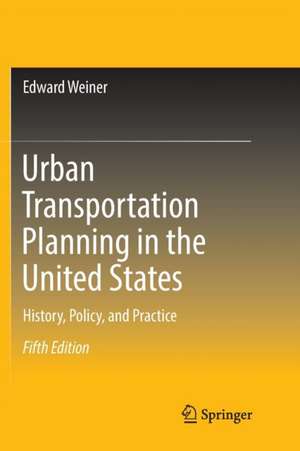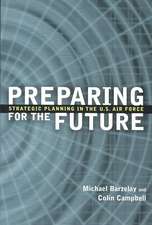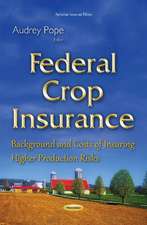Urban Transportation Planning in the United States: History, Policy, and Practice
Autor Edward Weineren Limba Engleză Paperback – 26 iun 2018
| Toate formatele și edițiile | Preț | Express |
|---|---|---|
| Paperback (3) | 727.97 lei 43-57 zile | |
| Springer – 28 oct 2010 | 727.97 lei 43-57 zile | |
| Springer – 12 dec 2014 | 948.92 lei 43-57 zile | |
| Springer International Publishing – 26 iun 2018 | 1006.55 lei 43-57 zile | |
| Hardback (3) | 462.97 lei 43-57 zile | |
| Bloomsbury Publishing – 27 feb 1999 | 462.97 lei 43-57 zile | |
| Springer – 13 noi 2012 | 954.93 lei 43-57 zile | |
| Springer International Publishing – 25 sep 2016 | 1012.70 lei 43-57 zile |
Preț: 1006.55 lei
Preț vechi: 1227.50 lei
-18% Nou
Puncte Express: 1510
Preț estimativ în valută:
192.62€ • 199.88$ • 161.00£
192.62€ • 199.88$ • 161.00£
Carte tipărită la comandă
Livrare economică 17-31 martie
Preluare comenzi: 021 569.72.76
Specificații
ISBN-13: 9783319820064
ISBN-10: 3319820060
Ilustrații: XIV, 442 p. 37 illus., 15 illus. in color.
Dimensiuni: 155 x 235 mm
Greutate: 0.64 kg
Ediția:Softcover reprint of the original 5th ed. 2016
Editura: Springer International Publishing
Colecția Springer
Locul publicării:Cham, Switzerland
ISBN-10: 3319820060
Ilustrații: XIV, 442 p. 37 illus., 15 illus. in color.
Dimensiuni: 155 x 235 mm
Greutate: 0.64 kg
Ediția:Softcover reprint of the original 5th ed. 2016
Editura: Springer International Publishing
Colecția Springer
Locul publicării:Cham, Switzerland
Cuprins
Preface.- Introduction.- Early Highway Planning.- Roots of Urban Transportation Planning.- Launching the Interstate Highway Program.- Urban Transportation Planning Comes Of Age.- Improving Intergovernmental Coordination.- Rising Concern for the Environment and Citizen Involvement.- Beginnings of Multimodal Urban Transportation Planning.- Transition to Short Term Planning.- Emphasizing Urban Economic Revitalization.- Decentralization of Decision-making.- Promoting Private Sector Participation.- The Need for Strategic Planning.- The Growth of Sustainable Development.- Expanding Participatory.- Moving Towards Performance Based Planning.- Concern for Climate Change.- Era of Constrained Resources.- Infrastructure Resilience.- Challenge of Funding.- Concluding Remarks.- Appendices.- List of Abbreviations.- References
Notă biografică
Ed Weiner is currently a transportation consultant in private practice. He has more than 35 years experience working for the U.S. Department of Transportation. He has worked in the Office of the Secretary, Policy Office where he was responsible for a wide range of issues on transportation policy, planning, analysis, research, and legislation. Prior to this position, Mr. Weiner was a highway research engineer in the U.S. Federal Highway Administration.
Textul de pe ultima copertă
In this new fifth edition, there is a strong focus on the increasing concern over infrastructure resilience from the threat of serious storms, human activity, and population growth. The new edition also looks technologies that urban transportation planners are increasingly focused on, such as vehicle to vehicle communications and driver-less cars, which have the potential to radically improve transportation. This book also investigates the effects of transportation on the health of travelers and the general public, and the ways in which these concerns have become additional factors in the transportation and infrastructure planning and policy process. The development of U.S. urban transportation policy over the past half-century illustrates the changing relationships among federal, state, and local governments. This comprehensive text examines the evolution of urban transportation planning from early developments in highway planning in the 1930s to today’s concerns over sustainable development, security, and pollution control. Highlighting major national events, the book examines the influence of legislation, regulations, conferences, federal programs, and advances in planning procedures and technology. The volume provides in-depth coverage of the most significant event in transportation planning, the Federal-Aid Highway Act of 1962, which created a federal mandate for a comprehensive urban transportation planning process, carried out cooperatively by states and local governments with federal funding. Claiming that urban transportation planning is more sophisticated, costly, and complex than its highway and transit planning predecessors, the book demonstrates how urban transportation planning evolved in response to changes in such factors as the environment, energy, development patterns, intergovernmental coordination, and federal transit programs. This new edition includes analyses of the growing threats to infrastructure, new projects in infrastructure resilience, the promise of new technologies to improve urban transportation, and the recent shifts in U.S. transportation policy. This book will be of interest to researchers and practitioners in transportation legislation and policy, eco-justice, and regional and urban planning.
Caracteristici
Investigates the implementation and effects of new technologies in transportation planning and infrastructure building
Analyzes the major threats to urban transportation and infrastructure in the 21st century
Further investigates the half-century of urban transportation policy in the U.S. and issues like climate change, energy, congestion, and private vs. public funding
Includes supplementary material: sn.pub/extras
Analyzes the major threats to urban transportation and infrastructure in the 21st century
Further investigates the half-century of urban transportation policy in the U.S. and issues like climate change, energy, congestion, and private vs. public funding
Includes supplementary material: sn.pub/extras



















